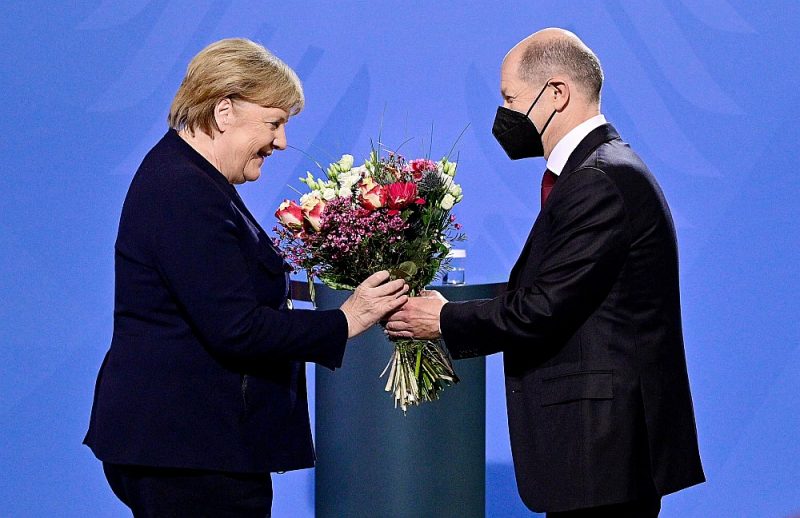
German newly elected Chancellor Olaf Scholz congratulates former Chancellor Angela Merkel, who has ruled the country for 16 years.
Photo: John MacDougall / AFP / SCANPIX
Valdis Bērziņš, “Latvijas Avīze”, JSC “Latvijas Mediji”
The German Bundestag yesterday elected Social Democrat leader Olaf Scholz as the new chancellor, whose party won the parliamentary elections in September and will replace 16-year-old former conservative politician Angela Merkel. In a secret ballot, 395 of the 707 deputies voted in favor of Sholc in 736 seats. His election required 369 votes.
–
The news
“Once upon a time, drinkers rushed to the police, but not already a member of the Saeima,” Vārpiņš believes that Gobzems is “pulling” the people to anarchy.
19 hours
–
The news
In Estonia, salt is no longer poured on the streets. Why has Latvia not taken such a step by saving cars and nature?
17 hours
–
The news
VIDEO. An unexpected guest! The deer rings politely at the door with a horn
16 hours
–
Following a vote in the Bundestag, President Walter Steinmeier officially appointed Scholz as Germany’s ninth post-war chancellor in a post-war ceremony. Scholz and members of the government then took the oath of office. Former Chancellor Angela Merkel, who is no longer a Member of Parliament, watched the ceremony from the gallery. Before the start of the parliamentary session, the legislators got up and greeted him with applause.
Pandemic forces must be joined
Sixty-three-year-old Scholz heads the coalition government of the Social Democrats (SPD), the Green Party and the Liberal Free Democratic Party (FDP), which has seven ministers, five for the SPD and four for the FDP. The co-chair of the Greens, Robert Habek, is the vice chancellor and heads the “super-ministry” in charge of the economy, energy and climate issues.
He pointed out that Germany must be able to combine the reduction of greenhouse gas emissions with the provision of prosperity. Annalen Berbock, co-chair of the Green Party, who became the country’s first foreign minister, said the coalition agreement was in line with the social reality facing Germany.
FDP leader Christian Lindner, who has been appointed finance minister, said it was time to act, adding that they had no illusions about the serious problems that needed to be addressed. Scholz had previously announced that the new government would take office immediately, stating that the fight against the pandemic would require all the forces of the new coalition. As Germany tries to stem the fourth wave of the pandemic, the country recorded the highest number of covide deaths since February.
The number of new cases of covid infection has reached almost 70,000, which is 2,415 more than a week ago. 527 people have died from covids, the highest daily rate since Feb. 12, according to the Robert Koha Institute. The total number of deaths in the country since the beginning of the pandemic has exceeded 104 thousand. Health facilities are overburdened, especially in the most severely affected regions. In an effort to activate the vaccination campaign, government officials agreed last week that only essential services, such as grocery stores and pharmacies, would be available to the unvaccinated.
Looking forward to the energy of the new coalition
Scholz, who has been Germany’s vice chancellor and finance minister since 2018, is an experienced politician, but has not had to lead a three-party coalition where partners may begin to show differences of interest over time. Prior to that, Scholz had successfully run the government in Hamburg, which has the status of a federal state. While working in Hamburg, he was guided by two basic principles: never to be offended and never to become hysterical. As Chancellor, Scholz expressed hope that the new coalition would give new energy to the country’s development.
The new government plans to step up efforts to combat climate change and expand the use of renewable energy so that the country can phase out coal in 2038, “ideally” as early as 2030. According to experts, the Green Party has taken the biggest risk by joining the coalition government, as its goals to limit carbon emissions may conflict with the priorities of the partners. Experts note that Germany urgently needs to modernize its communication networks and services. The government plans to increase the minimum wage to 12 euros from the current 9.60 euros, which would mean an increase in income for about ten million people. The coalition agreement promises to build 400,000 new apartments a year to curb rising rents.
For a strong EU and NATO
Chancellor Scholz has announced a succession in foreign policy, advocating a strong European Union and strengthening transatlantic ties. The new German chancellor will pay his first official visit to Paris on Friday, where he will meet with French President Emmanuel Macron and then visit Brussels.
The Chancellor’s Office has stated that Scholz’s decision to pay a first visit to France confirms the close relations and friendship between the two countries. A meeting with Urzul von der Leien, President of the European Commission, and Charles Michel, President of the European Council, is scheduled to take place in Brussels. Politicians will discuss the agenda for next week’s European Union summit. Sholcam is also scheduled to hold talks with NATO Secretary General Jens Stoltenberg to emphasize the organisation’s importance to Germany, Europe and transatlantic security.
Themes
–

:quality(80)/cdn-kiosk-api.telegraaf.nl/a910179e-5881-11ec-b683-02c309bc01c1.jpg)
